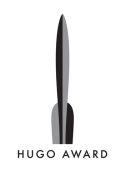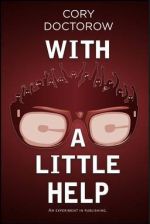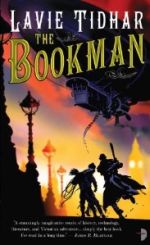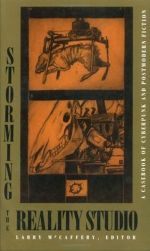Ask Not
Six months, and a third person knocked on my door.
I opened it to find a young Iranian man standing on my front porch, wearing a charcoal suit and a black tie as long and as narrow as a pencil, swinging a fat leather briefcase as if it were a free weight. The gentle breeze fingercombed his dark hair. The tiny hybrid car sitting in the yard had somehow gotten him through several miles of rutted, weedy road mostly intact.
“Good morning,” he said, teeth flashing brilliant white against his almond skin, his accent a mixture of British vowels and Farsi cadences. “I’m here to offer you the opportunity of the century.”
Suspicion clenched my gut. There must be a goddamned beacon pixelled on my house. Even though it’s forty miles from the nearest town and buried deep in the remote Colorado hills, these…people seemed to find me. I blinked at the young man, hoping against hope he would be a nice normal human. But my luck with anything resembling that had taken a turn for the worse.
“Come on in.” I pointed to the couch. “I don’t have much use for salespeople, and you’ve interrupted my canning. You have five minutes.”
He stepped inside, his nose wrinkling at the scents of peeled tomatoes and green beans. I’d noticed his ilk didn’t care for the smells of the natural world; they obviously felt insulted at the puncturing of their cybernetic bubble. He glanced at the computer desk filling the corner. “Your setup is twenty years out of date.”
Well, whoop-tee-doo. My “setup” looked just fine to me, with the laptop, printer, and various piles of books, papers and CDs, divided by my favorite pens. The dictionary next to the printer made him frown, and I wondered if he knew what it was. I sat at the desk, turning the chair to face him. “I suppose you’re here to sell me the newest all-in-one voice-operated monster?”
“Hardly,” he said. “My company has advanced far beyond that. I’m here to sell you the next generation of Internet access.” He plopped his briefcase on the coffee table and reached inside, withdrawing a carefully folded silk handkerchief. With a flourish of pursed lips and fluttering fingers, he peeled back the layers of cloth to reveal a half-dozen fingernail-sized chips.
Another one. I stared at his face, bifurcated by a tight smile and calculating grey eyes. How does he see me? As a human being, a woman, or a bipedal-shaped pattern of ones and zeroes? The silence stretched as he waited for my reply. “What the hell are those?” I finally asked. Play the game, play the game until he snaps.
A loud hiss interrupted us. I looked over to see my cat standing in the hallway, swelled up like a puffer fish.
The salesperson stared. “What is that?”
Well, Sabrina does have a bit of an unsettling effect. She’s thirty pounds of plushy gray fur, tufted ears and oversize paws. “That’s my Lynx-Maine Coon.”
A harsh laugh came from him. “I’ve never heard of that. Did someone design her?”
“Just the old-fashioned designer called copulation.” At his puzzled look, I waved the subject away. “Get to the point, mister.”
“Aren Lashkari,” he said, turning his attention back to his chips.
Sabrina began to deflate, walking as softly over the hardwood floor as if it were a snowdrift, until she reached my chair. She sat next to it, her golden gaze riveted to the young man. I rested my hand on her head, feeling her deep rumbling growl vibrate up my arm.
There went my last hope for a good day, dammit. I didn’t want this. I had never wanted this. But the vagaries of Fate thrust it upon me anyway, all because I am capable of pulling the trigger.
Aren took a deep breath. A tic twitched his left eye. “What is your name, please?”
“Lucy Stone.”
“What I am offering you today, Lucy, will revolutionize the planet. These chips represent not only the next phase of Internet access, but the final one. They are designed to be implanted in your body, utilizing the electro-chemical impulses produced by the brain and nervous system as their power source. In effect, you become your own computer. You’ll never have to buy a system again.”
“That’s fine,” I said, “but that pile of toenail clippings doesn’t mean anything.” I flicked a finger at the chips nestled in the handkerchief. They winked back, glowing a baleful gray in the light streaming through the front window. The little bastards probably recognized me already. “You came out here in the middle of nowhere, spouting this nonsense. Why should I believe you?”
“I can prove it,” Aren said. “My company doesn’t expect any customer to blindly accept its assertions. After training, all our representatives are implanted with the chips.”
“These exact ones?”
He smiled. “Actually, I carry the third generation.”
I folded my arms and leaned back in my chair. Beside me, Sabrina tensed, her huge front paws kneading the floor, claws flexing.
“All right,” I said, “log in and show me what you’ve got.”
Aren nodded. His lids dropped down and his eyes rolled back in his head, a thin curve of eyeball showing beneath the dark lashes. A few seconds’ pause and his lids slid up. The left eye bore several flecks of blood, red pinpricks on a white canvas.
“I’m now logged on and looking at my homepage.” Apparently this projects on the inside of the eye, and indeed, both eyes had turned slightly inward, focusing on something I could not see. “Please ask me whatever questions you like. News, current stock prices, tweets, weather reports.”
For the next ten minutes, I bombarded him with questions, and he answered in a rapid-fire staccato. Each sentence seemed to pop more blood around his left iris. The break finally came following a question regarding the President’s poll numbers. Aren paused, ostensibly searching for the answer–but I watched as that left eye once again rolled back in his head and the lid drooped to cover it. The silence lengthened as his body stilled. He took a breath as if to reply, and the closed eye snapped open, revealing a white swollen with blood. The pupil filled the entire iris, creating a black, crimson-lined tunnel. I could have sworn I could peer all the way to the end of that tunnel, where a chip pulsed with malevolent life.
One hand darted into his briefcase and came out holding something–a gun, a knife, a Taser–and Sabrina leaped. Her fangs sank into his arm and her weight dragged him down, and the weapon went sliding under the couch. This allowed me to yank open my drawer and whip out my Remington (you can hide just about anything in a big computer desk). The metallic snick of a pump-action shotgun would have made anyone else wet their pants, but our friendly zombie had already gone over the edge.
He lunged to his feet, Sabrina dangling from his arm like a furry cufflink. I raised the Remington and thought: I’ll be hanged if I’m mopping the floor and patching the walls again. Instead, I yelled, “Sabrina! Out back!” and took off running.
I may be staring down the barrel of fifty, but living alone and keeping up a house and property damn well keeps you in shape. I flung open the back door and stomped down the steps, taking a position in the yard where the solar panels would not reflect the afternoon sun into my eyes. Above me, the wind turbine squeaked on its tower, adding an eerie dissonance to the proceedings. A pungent, earthy scent tickled my nose, and I realized I was making my stand right in front of the compost pile. Hell, if it wasn’t for the nuisance of bones and teeth, I could have used some more organic material.
The zombie lurched out the back door. He was already losing coordination, which they all seem to do when the chips eat enough holes in their brains. Not to mention the fact that an enraged Sabrina clung to his back, her paws curving around his face as if they were playing blind-man’s-bluff. Those elongated claws had sunk deep into the now-empty eye sockets, and what was left of the eyes themselves gooshed down his cheeks like a couple of raw eggs.
But the goddamned thing kept coming. He bared his teeth and snapped his jaws together, his fingers curling as if already clamped around my throat.
“Sabrina,” I said, taking aim as they approached. The Remington held seven shells, which should be enough. A lot of people don’t like a pistol-grip, but I’ve practiced enough to put every round into the center of a paper plate at forty yards. “On the count of three. One–”
The zombie staggered as he walked, pitching to the left. Holy crapola. Now I had to account for the uneven gait.
“Two–”
Sabrina shifted her weight, draping herself over his left shoulder. Her eyes met mine, ears pricking as she waited for her cue.
“Three!”
She pushed off just as the zombie stepped, twisting neatly in midair to land several feet away, and her weight overcame his lurch, positioning him beautifully upright. My finger squeezed the trigger. One slug to the heart, one to the head, and that was all she wrote. The body hit the ground in a burst of blood and brains, thrashed once, and slumped into stillness. I stepped back, holding my hand over my nose as the sphincters released.
I’ve often wondered how I can do this with such equanimity. These were real people, once upon a time. Maybe it has something to do with growing up on a ranch, where we raised our own vegetables, butchered our own meat, and solved our own problems. Or maybe it’s the memory of my grandmother, wielding her Ruger Bearcat against a rattlesnake who found its way inside her henhouse and saying, “If you don’t get the little pricks right away, they’ll come back and bite you in the ass.”
* * *
By now, I had the cleanup down to a science. Pull out one of my painter’s tarps, roll the body onto it, and wrap it up. Rake together the detritus and shovel it into a bucket. Disconnect the little hybrid car’s battery pack, turning off its computer “brain” and any global positioning systems it might harbor. Wrestle the body, bucket, and briefcase into the trunk. Take a sledgehammer and smash the chips into dust. Get my tow bar, hook on to the hybrid with my Jeep, and tow it a little more than a mile away, to Trinity Gulch. Chacuaco Creek has carved a gorge twenty feet deep there, and this particular spot, with its sharp 90-degree angle where the water never quite drains away, holds a pretty large quicksand pool. Large enough for two previous vehicles and their occupants, at any rate. Unhook the hybrid and ease the Jeep against its rear bumper. Put the Jeep in low-low and push the car forward, an inch at a time, until the front wheels go over the edge and it tumbles into space, plunging into the soft shifting mass at the bottom. Watch, shivering, as the brown ooze creeps up the sides and sends engulfing fingers across the undercarriage, until only the tires remain, jutting above the sand like four bald heads; and one by one they disappear, and the surface is as smooth and undisturbed as it was half an hour before.
Go home, sit on the front porch, and get quietly drunk.
Eight months ago, I had my last truly human visitor. I’d called La Junta for the yearly refill of my propane tanks, and the driver came out a day later. It was the same person I’d gotten the past few years, a Navajo man named Brent Yazzie. When I came out to sign the invoice, he said, “This is the last time you’ll see me. I’m going home to Kayenta.”
This surprised me. He had a good job and seemed the type who needed stability in his life. “Is your family there?”
He shook his head. “I’m an only child, and my parents are dead.” He squinted against the sun, the lines on his weathered face crawling with apprehension. “I don’t want to be away from the rez any longer. This world frightens me.”
“Why?”
“It’s becoming too good.”
I felt my brows arch into my forehead. “That’s a bad thing?”
“For humanity, yes. We are a ruthless, selfish people, and we always have been, all the way back to First Man and First Woman.”
“Maybe we’re finally growing up.”
“If that ever happens, it will take place over hundreds of years. Not within a single generation.”
He seemed quite serious. I gave him the invoice and wished him well, and watched as he turned the tanker truck around and rumbled down my road. When I went inside, I glanced at my laptop, set to catch the daily news. It showed a broadcast of the President’s latest foreign-policy triumph. Another treaty signed, another war stopped.
I’ve been here for ten years. I was born and raised on an isolated ranch, and I’d hoped to die on one. But I also have a satellite link that connects me to the outside world, and I couldn’t get Brent Yazzie’s words out of my mind. I began to notice the huge strides being made in international cooperation and plain old problem-solving–everything from hunger and climate change to the empowerment of women and the development of alternative energy. Even something so simple, and so improbable, as both houses of Congress working together to pass legislation.
Six weeks later, the first zombie showed up at my door.
* * *
Once is a coincidence, twice is a theory, and three times is a fact.
A thunk at my feet yanked me back to the present. I looked down to see Sabrina batting around a small, narrow object. She must have clawed the zombie’s weapon from under the couch. She flipped it with one huge paw, and I leaned over to examine it.
A Taser, all right. I’d heard the newer versions were tinier and more deadly than ever, and this one measured maybe five inches. Dull black, with a cartridge that would fit in the palm of my hand. A dial on the front sported red and green sections, presumably measuring the lethality of the jolt–and surprise surprise, it had been turned all the way into the red.
He’d meant to kill me, of course. I’d known that from the moment I saw him standing there. But I now had proof the violence was escalating, as the previous two zombies had been armed with only their hands and teeth–and the first, a petite dark-haired woman, took me by surprise and came within a shaved inch of slashing my throat with her fingernails, until Sabrina knocked her on her behind.
Somebody, somewhere, had noticed their little Internet assassins weren’t coming back.
“All right, already.” I picked up the Taser and thumbed the off switch. The dial and LCD went dark. “I suppose you think I ought to take my head out of my ass and do something.”
Sabrina stared at me for a long moment. Then she jumped off the porch, trotted across the yard, and leaped on the hood of the Jeep, peering in the general direction of La Junta. She sniffed the breeze and gave what could only be interpreted as an impatient hiss.
“Well, rain on you, sunshine,” I grumbled. I emptied the last of my shot glass down my throat, thought about filling it again, and decided I really didn’t need to puke. As much as I wanted to wipe out the past few hours, that wouldn’t solve anything.
Neither would sitting here waiting for the next zombie and its AK-47.
Goddammit, I didn’t want to do this. I didn’t want to be a hero. Lucy the middle-aged, cranky-ass zombie killer? For crying out loud. I wanted to finish my canning, re-seed the greenhouse with my winter vegetables, and get on with my life. But for some ungodly reason, Sabrina and I had bullseyes on our backs.
Just the old-fashioned designer called copulation and God only knew what else.
Sabrina showed up a year and a half ago, appearing on my porch as abruptly as the zombies. I opened the door and she waltzed right in, dragging her tremendously long tail behind her. This fluffy appendage tacked to an unmistakably Lynx body, swathed in a thick domestic coat, made me choke on my coffee. She jumped on the kitchen table and fixed her golden eyes on me in as intense a look as I’ve ever received from anyone, including concupiscent men. After a long moment, she broke the gaze and started licking a front paw nearly as big as my own hand.
I’d intended to place an online ad searching for her owner, but the longer she stayed and the more demonstrations of her intelligence I received, the less that seemed like a good idea. Like her refusal to respond to the usual high-pitched “kitty kitty,” stalking off in a stiff-tailed fury until I started speaking to her as I would a human(ish) companion. Or the shock of booting up the computer and glancing over my shoulder to see her staring at the screen, her eyes moving back and forth in an eerie approximation of someone reading.
But the final revelation came the morning I turned on the TV for some background noise while I bustled around the kitchen. A program about an annoying little dog started, and just as my teeth were beginning to grind I saw movement out of the corner of my eye. I looked to see Sabrina jump off the couch, stride purposefully towards the wall-mounted television, rear up and hit the off button with her paw, plunging the house into silence.
I froze. Her head turned and her eyes found mine. A shiver rippled through me; there was nothing animallike about that unblinking gaze. I grabbed the edge of the counter and hung on as the world shook around me–but it really hadn’t moved. My mind had. It had turned itself inside out to accommodate a nonhuman intelligence.
The same intelligence that had warned me about the zombies.
“What do you think, Bree?” My voice scraped from my throat. The wind picked up, bringing the wet, sharp scents of rain and ozone. To the west, where the last ribbons of sunset slowly faded into the earth, dark clouds crawled over the hills. “Is it time to go into the big bad world and find out what the hell is going on?”
She jumped off the hood of the Jeep and came to me. Her eyes shone like yellow spotlights in the dusk as she reared up and rested both front paws on my knees, bringing our heads almost level. Hers is classical Canadian Lynx: black-tufted ears and a white double ruff under the chin. Her unflinching stance reminded me of my grandmother, who raised me after my mother died and filled my head with pearls of hardscrabble Appalachian wisdom. I could imagine my granny taking in the situation, sitting me down and asking one question: “If you don’t do it, who will?”
“Holy crapola.” I sighed and closed my eyes. Sabrina pushed her face against mine, her whiskers tickling my nose. She rarely makes typical cat sounds, but I could have sworn I heard a rusty purr vibrating in her chest.
Another of my grandmother’s pearls rolled through my mind, one she claimed belonged to someone else: a President seventy years dead. I couldn’t remember the entire quote, but it began with, “Ask not what your country can do for you…”
“Oh, to hell with that,” I said. I glared over Sabrina’s head at the approaching storm. “This isn’t patriotism. This is goddamned survival.”
Sabrina’s mouth fell open in the nearest approximation of a smile her feline face could muster. She rubbed her head against my knee as we went inside to pack.
The End
Bonnie McDaniel was born and raised in Prescott, Arizona, and still lives there, one of the few who can call herself a native. She works as a pharmacy technician for the Veteran’s Administration. An only child, she told stories for her own entertainment from an early age, and is surprised and humbled that others enjoy them. Her work has appeared in the magazines Parchment Symbols, Black Satellite, The Vampire’s Crypt, Tales of the Talisman, and Kaleidotrope. Drop by her LiveJournal http://redheadedfemme.livejournal.com/ or follow her on Twitter http://twitter.com/redheadedfemme.
























3 comments
[…] Cassondra Link: The protagonist in Ask Not is exactly the kind of person one would want to be in a post-apocalyptic scenario: strong, brave, […]
[…] Ask Not by Bonnie McDaniel […]
[…] “Ask Not” by Bonnie McDaniel at Redstone Science […]